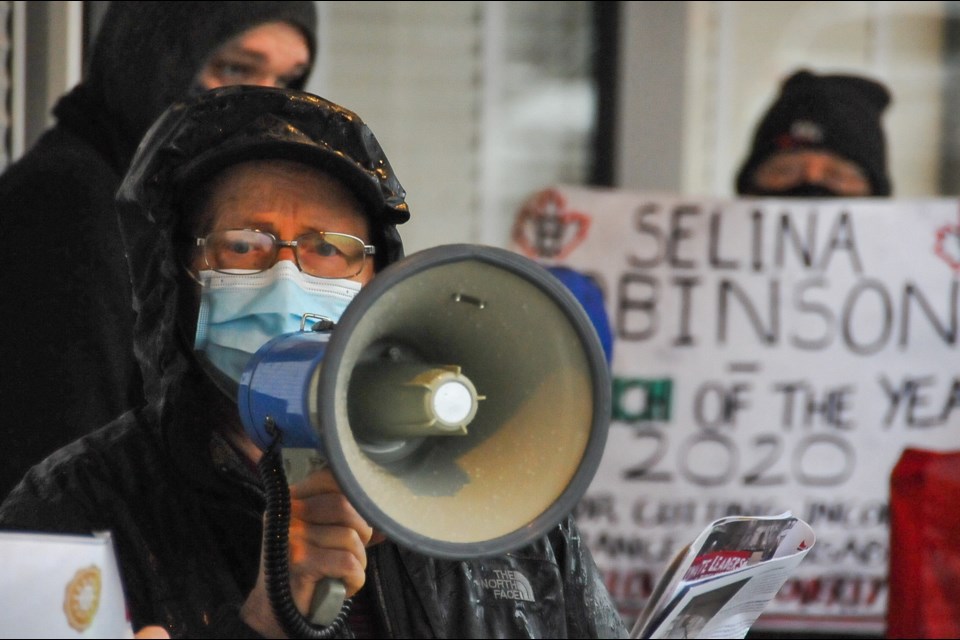A handful of protesters descended on B.C. Finance Minister Selina Robinson’s Coquitlam office Wednesday, demanding the province reinstate what it described as “clawbacks” in monthly payments to people with disabilities across the province.
Heavy rain kept the crowd under the Austin Avenue awning as they pasted a “2020 Grinch of the Year award” to the Coquitlam MLA’s constituency office in protest of the reduction in government payments.
“She’s the finance minister, she’s the one who essentially clawed back this money from people. So she deserves this award for a personal attack on the province’s poorest people,” said Tabitha Naismith, an organizer with the anti-poverty group ACORN.
Naismith, who has worked on the poverty reduction advisory committee for the province’s Ministry of Social Development & Poverty Reduction, said the group is looking for the government to follow through on commitments to permanently increase disability and income assistance payments so that they keep pace with the rising cost of living and keep people above the poverty line.
Earlier in the pandemic, the BC NDP government began issuing a $300 COVID-19 crisis supplement for those on income and disability assistance.
Then came the BC Recovery Benefit on Dec. 18, tax-free payments of up to $500 for individuals and up to $1,000 to families. Those on disability and income assistance, the government said, would be among the 3.7 million British Columbians eligible for the just-in-time-for-Christmas payments.
At the same time, the $300 crisis supplement would end in December, replaced by a $150 a month in the new year, and cut completely by March 2021.
“To claw back the $300 is inhumane,” said Naismith. “I’m a single parent. I have two small children. This extra $300 a month has helped me get food for school, clothing, the things that they need.”
‘IT ENDS THIS MONTH’
Speaking before the legislature on Dec. 17, Robinson pushed back against the idea that the reduction in disability and income assistance payments amounted to a “clawback.”
“The program, the crisis supplement, ends. It ends. It ends this month. There is nothing beyond that. Rather than just have the program end, we’re saying let’s do another supplement on top of the recovery benefit so that people can have some support over the next number of months,” said Robinson.
The minister also pointed to the long arc of the program, to the fact the NDP government increased income assistance payments by $100 in 2017 and another $50 in 2019 — something Naismith conceded had not occurred in roughly a decade of BC Liberal government.
Robinson was not available for comment but a spokesperson told the Tri-City News the government will “continue to monitor supports for people through the pandemic and review Income Assistance and Disability Assistance rates through the budget process.”
The spokesperson added that starting Jan. 1, the monthly earnings exemption for people on income assistance will increase from $300 per month to $500 per month. That, wrote the spokesperson in an email, “means people are able to earn more money while maintaining their full benefits.”
Annually, the earnings exemption for people receiving disability assistance will increase from $12,000 to $15,000 per year, added the spokesperson
‘NO ONE WAS HIRING’
Others showed up to Robinson’s office in a wider call to fight against poverty and a rising sense that wages are failing to keep pace with the cost of living.
Retired electrician Roland Verrier has lived in Coquitlam since the 1940s. When he bought his house near Mundy Park in 1967, he said it took him eight years to pay off.
“Now, these young electricians coming up, they can’t even afford a down payment,” he said, before turning to people on income and disability assistance.
“These people that really need it, why aren’t they getting the help? And we’re supposed to be in it all together?”
Others at the protest included Coquitlam’s Ash Manohar, who graduated with an economics degree from Simon Fraser University and was looking to start her career when the pandemic hit.
“I got out of school then I was looking for a job and no one was hiring,” she said.
Ineligible for federal relief, Manohar said she was forced to leave her apartment and move back in with her parents.
“I was one of the categories of students that slipped through the cracks,” she said.
Working a couple of part-time jobs, tutoring, living in her parents' basement — it’s not what the young woman had in mind back in the spring.
“It’s a bit difficult,” she said. “Obviously, over the next 10 years, [the pandemic] will be temporary. Right now, it looms large. It feels like my life has taken a turn for the worse. All the plans that I had before the pandemic, I had to throw them away and start all over again. You have to take it all in step, I guess.”
Still, Manohar said she’s grateful for cheap rent and a roof over her head, something many other British Columbians struggle to keep up — all the more reason, she added, to keep pressure on the province to live up to its commitments.
“What people are just asking for is dignity of life,” she said.


